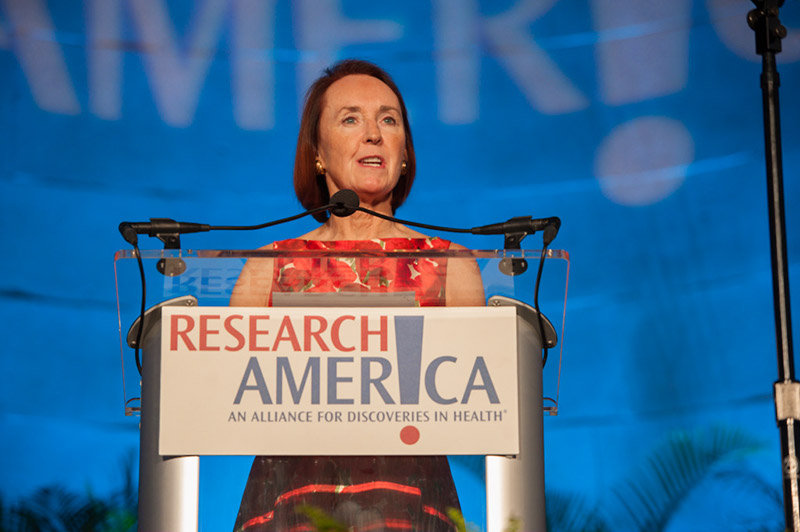Science Is America’s Best Ally

Dear Research Advocate,
As President Biden said yesterday during his inaugural address, “With unity, we can do great things. Important things.” Science has long been a unifier — for the public and policymakers alike — and, due to the pandemic, is more in the forefront now than in many, many years. Science is the right partner for “The hill we climb; If only we dare”, in the words of inaugural poet Amanda Gorman.
Last week’s announcement of the elevation of the Office of Science and Technology Policy (OSTP) director to the President’s Cabinet was groundbreaking, placing science and technology at the table, in the most literal sense. The nomination of Dr. Eric Lander as Presidential Science Advisor requires Senate confirmation. We will proudly support him for confirmation, and urge you to do so as well. The President also announced that Dr. Francis Collins will continue his outsize leadership at NIH. Other terrific appointments were made to OSTP and the President’s Council of Advisors on Science and Technology, as noted in our statement.
Science Strong Cabinet: Elevating OSTP to a Cabinet-level position is one of three recommendations put forward by the Science and Technology Action Committee (STAC), a coalition of nonprofit, academic, foundation, and corporate science and technology (S&T) leaders which I co-chair along with Dr. Sudip Parikh, CEO of AAAS, and Dr. Keith Yamamoto, special advisor to the chancellor for science policy and strategy, UC San Francisco. The group is working to strengthen our nation’s embrace of science and to empower us to out-innovate the existential threats we face.
The committee sent a transition letter to the then-incoming Biden Administration making the case for why we as a nation must lead with science and technology. Committee members Dr. Kristina Johnson, president of The Ohio State University, and Dr. Darío Gil, senior vice president and director of IBM Research, discussed the group’s Science and Technology Action Plan (STAP) in an op-ed featured in The Hill. The co-chairs published a letter to the editor in the Washington Post today. Please consider having your organization or institution join this growing movement by endorsing the STAP recommendations.
We Need Your Help: Securing supplemental funding to make COVID-19-eroded research grants whole continues to be an uphill battle. We must provide Members of Congress with a clearer picture of 1) what the challenges are; 2) how they’ve evolved; and 3) why taking action now is imperative. While we are at capacity for an alliance member discussion on this topic next week (Tuesday, January 26, 2021, at 2:30 p.m. ET) don’t let that stop you from weighing in! Please email Anna Platt to share your experience/ideas.
Who’s Next?: The Senate has begun holding hearings for Biden nominees. The hearing to consider California Attorney General Xavier Becerra’s nomination to lead HHS is not yet scheduled but is expected to be relatively non-controversial. The CDC Director does not need to be confirmed by the Senate; Dr. Rochelle Walensky assumed the helm yesterday. Dr. Janet Woodcock, the longstanding and highly-respected director of the FDA’s Center for Drug Evaluation and Research, will serve as FDA acting commissioner until a nominee is named and confirmed. Here is a note she wrote to the FDA staff yesterday about her appointment. We will keep you informed about additional movement in other key medical and health research roles in the new administration.
The Future is Now: More and more early-career scientists are seeking opportunities to engage with the public to address the challenges facing our communities and our nation. We are thrilled to help facilitate this work through our Civic Engagement Microgrant program, now in its third year. With support from the Rita Allen Foundation, we have made awards to 19 graduate student-led science policy groups. Spanning more than a dozen states across the U.S., these students are forging creative ways of interacting with community leaders and policymakers around the societal impact of science. Working virtually this year, students are planning podcasts, “reverse” science fairs, a local campaign to promote vaccine acceptance among many other activities. Read more about their innovative projects.
We encourage students — and everyone in science — to create opportunities for public engagement and healthy debate, the importance of which was recently well articulated by H. Holden Thorp, the editor of Science.
Opportunity for Your Voice: The National Science Foundation (NSF) is updating its strategic plan and wants input. Given the agency’s key role in supporting our nation’s leadership in research and innovation, we encourage you to weigh in by February 10, 2021.
What’s Next?: Less than one month into the new Congress and only one day into the new Administration, what’s the political climate in our nation’s capital? How will the Biden Administration and the 117th Congress work together to address COVID-19 and other urgent priorities? Join us tomorrow, January 22, 2021, at 2 p.m. ET for a lively look at these questions and more with Steve Clemons, Editor-At-Large of The Hill. Register in advance.
Stay well, stay safe, and stay connected.
Sincerely,
Mary Woolley




